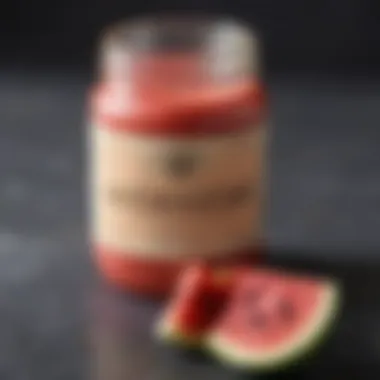Exploring Watermelon Seed Butter: A Culinary Innovation


Intro
The culinary landscape is ever-evolving, with novel ingredients emerging at a rapid pace. Among these, watermelon seed butter has started to pique the interest of food enthusiasts and health-conscious individuals alike. This article aims to explore the multifaceted nature of watermelon seed butter, looking not just at its flavor profile but also at its nutritional merits and diverse applications in home cooking. As people seek alternatives that pack a punch in terms of health benefits without sacrificing taste, watermelon seed butter stands out as an excellent candidate. Whether you're slathering it on toast or stirring it into smoothies, there's a world of flavor waiting to be uncovered.
Recipe Overview
Watermelon Seed Butter Bliss
- Yield: 8 portions
- Prep Time: 15 minutes
- Cook Time: 20 minutes
- Difficulty: Easy
Main Ingredients:
- 1 cup watermelon seeds
- 2 tablespoons honey or agave syrup
- 2 tablespoons coconut oil
- A pinch of salt
- Optional: Vanilla extract or cocoa powder for flavor.
This simple yet delightful recipe introduces watermelon seed butter as a creamy alternative to traditional nut butters. It’s a way to incorporate a lesser-known ingredient while keeping things tasty and nutritious.
Step-by-Step Instructions
- Prep the Seeds: Start by rinsing the watermelon seeds thoroughly to remove any debris. Pat them dry with a towel.
- Roasting: Preheat your oven to 350°F (175°C). Spread the seeds evenly on a baking sheet and roast for about 20 minutes, stirring occasionally, until they are golden brown. Keep an eye on them to prevent burning.
- Blend Away: Once roasted, let the seeds cool for a few minutes. Transfer them to a food processor. Add honey or agave syrup, coconut oil, salt, and any optional ingredients you might desire.
- Process Until Smooth: Blitz the mixture. You might need to stop and scrape the sides of the processor to ensure an even consistency. This may take around 3-5 minutes.
- Store: After you reach a smooth, creamy texture, transfer the butter into a jar. It can be stored in the refrigerator for several weeks.
Time-Saving Strategies: If you are in a rush, purchasing pre-roasted watermelon seeds can save time. Alternatively, soaking the seeds overnight may help in achieving a creamier consistency even before roasting.
Nutritional Information
- Calories per serving: Approximately 120
- Protein: 4 grams
- Fats: 10 grams
- Carbohydrates: 8 grams
Highlights of beneficial nutrients include magnesium, essential fatty acids, and amino acids that contribute to overall well-being and energy.
Quick Cooking Tips
- Gadgets: Don’t hesitate to use a high-speed blender if a food processor is not available. It can yield an equally fine butter if blended long enough.
- Multitasking: While your seeds are roasting, you can prepare other ingredients, like cutting fruits for a smoothie.
- Healthier Alternatives: Rather than honey, try using maple syrup for a vegan option. Experiment with additional flavors by folding in spices like cinnamon or nutmeg at the end.
Related Recipes & Variations
- Smoothie Booster: Add a spoonful of watermelon seed butter to your morning smoothie for a protein kick.
- Spread Ideas: Use it as a toast spread mixed with mashed bananas.
- Dietary Adjustments: For nut-free diets, watermelon seed butter can serve as an excellent alternative to peanut or almond butter, particularly in recipes aimed at children with allergies.
Readers are encouraged to try different combinations and share their twist on using watermelon seed butter in various dishes.
"Exploring culinary innovations like watermelon seed butter not only offers health benefits but also expands our flavor palette."
Dive deeper into this emerging trend, and bring a new level of creativity to your cooking!
Foreword to Watermelon Seed Butter


Watermelon seed butter is carving its niche in the culinary world, driven by a growing awareness of healthy eating. With an increasing number of people looking to replace conventional nut butters, this innovative alternative is making waves. For those with specific dietary needs or allergies, this seed butter provides a unique, creamy texture along with robust flavor without the nut content. In this section, we will explore its definitions, origins, and the historical backdrop that sets the stage for its rising prominence.
Definition and Origins
Watermelon seed butter is crafted by grinding roasted watermelon seeds into a smooth paste, similar to how peanut or almond butter is prepared. This nut-free product offers a delightful alternative, with the seeds being inherently rich in nutrients and beneficial oils. The name captures its essence perfectly: a spread made from the seeds of the watermelon, convenient for any culinary application, whether it is spreads, dressings, or dips.
The origins can be traced back to various cultures in which watermelon seeds were consumed, primarily for their nutritional benefits. In some regions of Africa and Asia, people have been using these seeds for centuries, often roasting and grinding them to enhance flavor and texture in different dishes. Today, as health consciousness continues to rise, this ancient practice is gaining traction in modern kitchens around the globe.
Historical Perspective
Historically, watermelon seeds have not always been regarded as mere waste but were seen as a valuable source of nutrition. Ancient cultures often valued these seeds for their supposed health benefits. In China, for instance, melon seeds have been a dietary staple, used in traditional medicine. They believed that these seeds had healing properties, contributing to overall health, especially during the summer months when the watermelon became a seasonal treat.
Fast forward to today, and the gastronomical landscape looks quite different. The resurgence of interest in plant-based diets and alternative foods has prompted chefs and culinary enthusiasts to experiment with watermelon seeds, thus leading to the creation of watermelon seed butter.
Not so long ago, the market was dominated by the usual suspects – peanut, almond, and cashew butters. But now, the seeds that once fell to the wayside are enjoying their moment in the spotlight. As more people educate themselves about the environmental and health impacts of their dietary choices, watermelon seed butter stands out as a refreshing option, offering new possibilities for flavor and nourishment.
"In the quest for healthier living, sometimes the most unexpected ingredients lead us to delightful innovations."
In summary, the introduction of watermelon seed butter not only adds a new flavor to the culinary repertoire but also highlights a shift toward using sustainable, nutritious options. This section sets the stage for understanding its nutritional profile, health benefits, culinary uses, and its potential for shaping future food trends.
Nutritional Profile
The nutritional profile of watermelon seed butter is not only intriguing but also a significant reason for its emerging popularity in the culinary world. As consumers become more health-conscious, understanding the nutrients packed into everyday food replacements is essential. Watermelon seed butter has proven itself to be a powerful alternative to conventional butters. It boasts an assortment of vital vitamins and minerals, healthy fats and proteins, and an array of antioxidants and phytochemicals.
Vitamins and Minerals
Watermelon seeds are treasure troves of essential vitamins and minerals. These small yet impactful seeds contain magnesium, zinc, iron, and several B vitamins.
- Magnesium, for instance, aids in muscle function and helps maintain a steady heartbeat. Given the modern diet's lack of this vital mineral, incorporating watermelon seed butter can enhance overall health.
- Zinc is another star player found in watermelon seed butter, contributing to immune system function and wound healing.
- The presence of iron is noteworthy as well, since it supports the production of red blood cells, critical for oxygen transport in the body.
- Lastly, B vitamins in watermelon seed butter assist in converting food into energy, essential for busy or active lifestyles.
It's clear that adding such a concentrated source of nutrients into one’s diet can only be beneficial, especially when shifting to healthier dietary options.
Healthy Fats and Proteins
In the whirlwind of healthy eating trends, fats and proteins have become golden buzzwords. Watermelon seed butter brings both to the table. The butter is rich in unsaturated fats, which are known for their heart-friendly properties. These healthy fats help in reducing bad cholesterol levels and may lower the risk of heart-related diseases.
- Moreover, the protein content in watermelon seed butter provides a satisfying alternative for those seeking to cut down on animal products without compromising their protein intake.
- A tablespoon of watermelon seed butter can deliver a good punch of protein, making it an excellent choice for athletes or anyone engaged in physical activity.
Having nutritious fat and proteins in one’s diet is foundational. They serve as building blocks for cells and provide energy that lasting throughout the day, facilitating a balanced, robust diet.
Antioxidants and Phytochemicals
Antioxidants and phytochemicals play a crucial role in how our bodies fight against oxidative stress and inflammation. Watermelon seed butter is rich in these compounds, which create a protective environment against various diseases.


- Antioxidants, like vitamin E found in watermelon seeds, are vital for reducing free radicals in the body. By combating oxidative stress, they may lower the risk of chronic diseases and promote skin health.
- Phytochemicals, including flavonoids, add another layer of health benefits. These naturally occurring compounds may enhance heart health and support the immune system.
With such an impressive collection of antioxidants, incorporating watermelon seed butter into diets can provide an additional defense against age-related ailments and bolster overall wellness.
"Investing in what nourishes our bodies is the first step toward better health—watermelon seed butter is a wise choice!"
Overall, the nutritional profile of watermelon seed butter speaks volumes about its potential role in modern diets. By integrating this innovative butter into daily meals, individuals can enjoy a plethora of health benefits while savoring rich flavors.
Health Benefits of Watermelon Seed Butter
Watermelon seed butter, often rather underrated in the butter realm, holds a treasure trove of health benefits that can appeal to those looking to boost their nutrition. This section unpacks how incorporating this unique spread into your diet can contribute positively to various aspects of health, establishing it as a worthy contender among traditional counterparts.
Heart Health
Heart health is a big deal, as many are aware of its increasing importance in today's world. Watermelon seed butter is packed with unsaturated fats, particularly oleic acid, which has been shown to support cardiac function. This fat type is well-known for its prowess in reducing bad cholesterol (LDL) levels while enhancing good cholesterol (HDL). When used as a spread or ingredient in cooking, watermelon seed butter could likely aid in heart disease prevention.
In addition to the healthy fats, these seeds contain magnesium, a mineral essential for maintaining a normal heart rhythm. Adequate magnesium levels can help stave off hypertension and other heart-related ailments. With watermelon seed butter, you might say you're spreading the love, not just on your toast, but also within your circulatory system.
Weight Management
For those on the weight management journey, watermelon seed butter presents a delicious option. The protein and fiber content in this butter can help keep hunger at bay, enhancing satiety and possibly leading to a reduced calorie intake.
A smooth spread of watermelon seed butter on whole grain bread could serve as a satisfying meal or snack, avoiding the empty calories of sugary spreads. People find that moderation and balance are key when it comes to weight loss. It's possible to indulge in this butter while staying mindful of serving sizes, allowing its nutritional benefits to shine through without feeling guilty.
Skin Care
When it comes to skin care, watermelon seed butter is quite the dark horse. Rich in antioxidants such as vitamin E and linoleic acid, it promotes healthy skin by protecting against oxidative stress. Applying watermelon seed butter directly onto the skin can soothe irritation and maintain hydration. It's like giving your skin a refreshing drink of water! Plus, the presence of zinc aids in healing wounds, making this butter a natural choice for those battling skin issues.
Utilizing watermelon seed butter can create the basis for luxurious DIY skin care recipes as well, adding a synthetic-free element to personal care routines. Just remember, nature truly offers some of the best solutions!
Digestive Health
The benefits extend to digestive health too. The fiber in watermelon seed butter plays an essential role in promoting regularity. Dietary fiber is critical for gut health, as it aids in digestion and helps prevent constipation.
Incorporating this butter into your diet could potentially assist in maintaining a balanced gut microbiome, which is crucial for many bodily functions. Food choices have a direct line to digestive efficiency, and what better way to enhance gut health than through something that tastes good?
In summary, watermelon seed butter not only serves gourmet purposes but also lays down solid foundations for a health-conscious lifestyle. By focusing on heart health, aiding weight management, enriching skin care routines, and promoting better digestion, this innovative food is certainly worth a spot on your kitchen shelf.
Production of Watermelon Seed Butter
The production of watermelon seed butter is a vital aspect to consider when exploring this culinary innovation. Not only does it highlight the resourcefulness of utilizing watermelon seeds that would typically be discarded, but it also sheds light on the meticulous steps involved in creating a product that is both nutritious and tasty. Understanding the production process helps to appreciate the relevance of watermelon seed butter in modern diets and its growing appeal as an alternative to conventional nut butters.
Seed Selection and Preparation


The journey of creating watermelon seed butter begins with the careful selection of seeds. It’s not as simple as just grabbing any seeds from a water melon; quality matters. Farmers often prefer seeds from organically grown watermelons to ensure they are free from harmful pesticides and chemicals. Once selected, the seeds undergo cleaning processes to remove any pulp residue that could affect the flavor and texture of the final product.
After cleaning, the seeds typically get dried. This crucial step ensures that any moisture is removed, making the grinding process much more efficient. Some producers may take an additional step by lightly roasting the seeds, which can intensify the flavor, much like how one toasts nuts for that extra crunch. However, this can also alter the nutritional profile slightly. For those interested in the raw benefits, skipping the roast may be a better option.
Processing Techniques
Processing techniques play a significant role in determining the texture and consistency of watermelon seed butter. Once dried, the seeds are ground using specialized equipment designed for seeds or nuts. The grinding process can vary in duration depending on the desired smoothness of the butter.
Most producers will use a stone grinder or a mechanical grinder, both capable of turning the seeds into a rich, creamy texture. It’s important to note that during this phase, adding a small amount of oil, such as sunflower oil or another light oil, can assist in achieving the desired consistency without compromising the health benefits.
After achieving the preferred texture, it’s critical to test the butter for flavor and aroma. The richer the flavor, the better the product. However, care must be taken not to burn the seeds during the grinding process, as bitterness can ruin a perfectly good batch.
Storage and Shelf Life
Proper storage of watermelon seed butter is crucial to its longevity and maintaining its flavor. Ideally, it should be kept in an airtight container and stored in a cool, dark place. Refrigeration is often recommended, especially for homemade versions without preservatives.
With correct handling, commercially produced watermelon seed butter can typically last up to six months in the pantry and even longer in the fridge. It is essential to routinely check for any signs of deterioration, including off smells or changes in texture, as these can indicate spoilage.
"Watermelon seed butter not only provides an alternative to traditional nut butters but also reduces waste in food production, making it an eco-friendly choice for health-conscious individuals."
The production process of watermelon seed butter is a fine blend of careful selection, skillful processing, and proper storage practices. By embracing these elements, families and culinary enthusiasts can enjoy a healthier, sustainable spread that enriches both meals and snacks, contributing to the broader narrative of mindful eating.
Culinary Uses of Watermelon Seed Butter
Watermelon seed butter is more than just a trendy addition to health-conscious kitchens; it offers a vast range of culinary possibilities that can turn ordinary dishes into something extraordinary. With its creamy texture and nutty flavor, it serves as an excellent substitute for various fats and oils found in traditional recipes. You might be surprised by how seamlessly watermelon seed butter can fit into various culinary applications, enhancing both taste and nutrition. Let’s break down some of the key uses.
Spread and Dip
In the world of spreads and dips, watermelon seed butter stands out as a unique option. Its nutty taste pairs remarkably well with both sweet and savory flavors. Slathering it on toast, for instance, can elevate a simple breakfast from mundane to magnificent. Simply mixing watermelon seed butter with a bit of honey or maple syrup creates a delightful spread that can add a new twist to your morning routine.
Not stopping at breakfast, this butter can easily transform into a dip for carrots, cucumbers, or even apple slices. A quick blend with spices or some garlic creates a delicious and healthful dip that can easily compete with common hummus recipes. Plus, it's a solid alternative for anyone wary of peanuts or tree nuts.
"Watermelon seed butter isn’t just a new trend. It brings delicious flavor to the table while being a nutritious powerhouse that leaves your traditional options in the dust."
In Baking and Cooking
Watermelon seed butter has a versatility that shines in baking and cooking alike. For those who enjoy whipping up baked goods, substituting conventional butter or margarine with watermelon seed butter can introduce not only a richer flavor but also a healthier profile. Think about adding it to cookie recipes instead of typical nut butters or fats; you’ll find that it adds moisture while keeping the cookies soft and chewy.
In savory cooking, it serves as an unexpected ingredient in salad dressings. When blended with vinegar and herbs, it can bring a creamy texture that coats your greens beautifully without weighing them down. You could also use it as a base for sauces, lending a unique characteristic to your home-cooked pasta or rice dishes. The creamy context enhances every bite, making it worth a try for more adventurous home cooks.
In Smoothies and Shakes
When it comes to smoothies and shakes, watermelon seed butter is a game-changer. Adding a scoop into your morning blend not only amps up the protein content but also gives it a delicious nutty flavor reminiscent of sunflower or traditional peanut butters.
For a simple yet nutritious smoothie, you could blend fresh fruits like bananas and strawberries with a tablespoon of watermelon seed butter and some almond milk. The result is a creamy, filling treat that keeps you satisfied throughout the morning. The butter envelops the sweetness of fruits with its rich taste, giving your drink a level of depth that won’t go unnoticed.
Also, consider combining it with oats for a breakfast shake that sustains both energy and fullness:
- 1 cup almond milk
- 1 banana
- 2 tablespoons watermelon seed butter
- 1/2 cup oats
- Optional: a pinch of cinnamon







